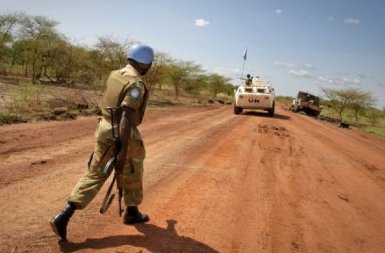UNSC renews mandate of Abyei peacekeeping mission
May 30, 2014 (JUBA) – The United Nations Security Council on Thursday renewed the mandate of its peacekeeping mission in Abyei, calling for the establishment of an administration and council in the disputed area.

The Security Council, in its Thursday resolution, also decided to maintain the troops already deployed in accordance with a previous resolution approved one year ago, which authorised the UNISFA to increase its number of troops to 5,326.
The Council also reiterated its demand that Sudan and South Sudan immediately resume the work of their joint oversight committee on Abyei to “ensure steady progress on the implementation of the 20 June 2011 Agreement,” said the resolution.
The UN Security Council “further reiterates its demand that Sudan and South Sudan urgently commence the establishment of the Abyei Area Administration and Council, including by resolving the deadlock over the composition of the Council, and constitute the Abyei Police Service, to enable it to take over policing functions throughout the Abyei Area, including the protection of oil infrastructure.”
On 20 June, 2011, the government of Sudan and representatives of South Sudan signed the Agreement on Temporary Arrangements for the Administration and Security of the Abyei Area, calling for demilitarisation of Abyei and the establishment of an administrative and police service.
The Security Council, by its resolution 1990 of 27 June 2011, responded to the urgent situation in Abyei region by establishing UNISFA. The Security Council was deeply concerned by the violence, escalating tensions and population displacement in Abyei.
UNISFA’s establishment came after the Government of Sudan and the Sudan People’s Liberation Movement (SPLM) reached an agreement in Addis Ababa, Ethiopia, to demilitarize Abyei and allow Ethiopian troops monitor the disputed area.
SHORT DURATION
Francis Deng, South Sudan’s special envoy to the world body welcomed the UNSC decision on Abyei, but stressed that the four months given were too short to find a durable solution to the problems in the disputed area.
“To stabilise the situation in Abyei during the interim period as the leaders of South Sudan and Sudan negotiate the final status of Abyei, it is my opinion that the Ngok Dinka need and deserve to restore their erstwhile autonomous status which was combined with cordial and cooperative relations with the Missiriya, this time under internationally guaranteed security arrangement, and cooperation with the Government of South Sudan and Sudan”, he said in a statement.
The top UN official, however, told members of the UNSC that urgent measures were needed to stabilise the security situation between the Ngok Dinka and Missiriya in Abyei.
In October last year, more than 99% of Abyei’s Ngok Dinka residents voted in favour of joining South Sudan, according to the committee that organised the unofficial vote.
A planned referendum on Abyei, which was due to be held simultaneously with that of South Sudan in 2011, failed to take place amid ongoing disagreements between the Sudan’s over who was eligible to participate in the vote. As such, the fate the disputed oil-producing region, whose territorial ownership is still contested between the two nations, remains one of the most sensitive and divisive post-secession issues.
(ST)
